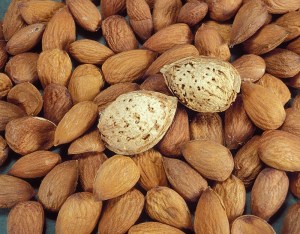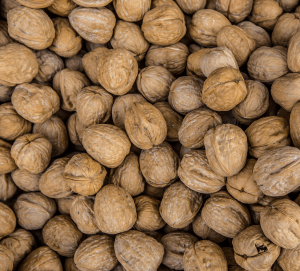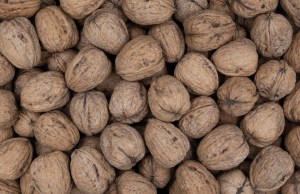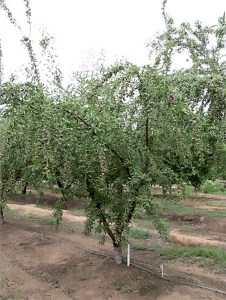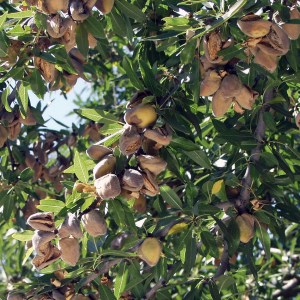Nut Trees
Bare Root Nut Trees
 Add some protein to your orchard by planting nut trees! Your choice should be decided by your palate and your climate.
Add some protein to your orchard by planting nut trees! Your choice should be decided by your palate and your climate.
Almond trees are botanically similar to peach trees, but they require more specific climactic conditions. Ideal situations include long hot summers and low humidity. The trees are relatively small, reaching about 20 to 30 feet at maturity. Almonds are one of the first to bloom so late frosts may destroy the blossoms or the small young fruit. Mission and Butte are a good pair; both are late bloomers and they pollenize each other. If you only have room for one tree, All-In-One almond is the best choice. When pruning your tree, bear in mind that almonds are born on spurs which remain for about 5 years.
Pecan trees are native to the southern and central U.S. Long hot summers provide the best environment for a good crop of nuts. The trees themselves are graceful, shapely and very large, reaching 70 feet tall and wide. If your climate is not ideal for producing nuts, the trees can be planted as large shade trees.
Add some protein to your orchard by planting nut trees! Your choice should be decided by your palate and your climate.
Almond trees are botanically similar to peach trees, but they require more specific climactic conditions. Ideal situations include long hot summers and low humidity. The trees are relatively small, reaching about 20 to 30 feet at maturity. Almonds are one of the first to bloom so late frosts may destroy the blossoms or the small young fruit. Mission and Butte are a good pair; both are late bloomers and they pollenize each other. If you only have room for one tree, All-In-One almond is the best choice. When pruning your tree, bear in mind that almonds are born on spurs which remain for about 5 years.
Pecan trees are native to the southern and central U.S. Long hot summers provide the best environment for a good crop of nuts. The trees themselves are graceful, shapely and very large, reaching 70 feet tall and wide. If your climate is not ideal for producing nuts, the trees can be planted as large shade trees.
More About Nut Trees
The most popular walnut varieties are the English walnuts. The black walnut, Juglans nigra, is an extremely large tree and the nuts are usually strong tasting and difficult to crack. We carry the variety Thomas Black which is thin-shelled and delicious. It is best suited to large areas without other landscaping as the roots produce a growth-inhibiting substance and are also very pervasive.
English walnut trees are much more desirable in the orchard, although they still get very large, growing to sixty feet high and wide. If you have limited room, Pedro is a good choice, growing to two-thirds the size of other varieties. The walnuts we offer all produce excellent nuts with great flavor.
The uses for nuts are endless - a snack, cookies, cakes, a crust for fish entrees or nut loaf as a main course.
Nut Tree Rootstocks
LOVELL (Lov.)
Vigorous, standard rootstock for plums, peaches, nectarines, apricots, prunes, almonds. More tolerant of wet soils than Nemaguard; also more cold hardy. Susceptible to nematodes in sandy soils. Provides good anchorage and high degree of disease resistance. Unpruned tree height of standard varieties 15-25 ft.; size can be controlled further with summer pruning.
MARIANNA 26-24 (Mari.)
Standard rootstock for apricots, plums, prunes, most almonds. Mature trees comparatively small, 15-20 ft. if unpruned; can be kept smaller with summer pruning. Shallow root system, much more tolerant of wet soils than Lovell or Nemaguard; is not tolerant of hot soils. Has tendency to sucker. Resistant to oak root fungus, root knot nematodes, root rot.
NEMAGUARD (Nema.)
Standard rootstock for nectarines, peaches, apricots, plums, prunes, almonds. Vigorous, resists root knot nematodes. Excellent for well drained soils. In heavy or poorly drained soil, plant on mound or hill. May not be winter hardy below 5°F. Unpruned tree height of standard varieties 15-25 ft., but size can be controlled further with summer pruning.
PARADOX (Para.)
Vigorous hybrid rootstock for walnuts. English varieties on Paradox are fast growing and productive at a young age. More tolerant of wet soil than Northern California Black, but less resistant to oak root fungus.
VIKING
Standard rootstock for almonds and peaches. Highly adaptable and deep rooted, tolerant of wet and clay soils. Vigorous, precocious, productive. Resistant to nematodes. Suckers very little, if at all. (Zaiger)

